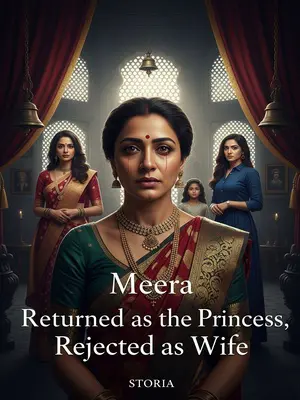Chapter 1: The Price of Favour
For twelve years, I lived in the shadow of the young zamindar, bearing him twelve children—each birth a prayer, each loss a silent wound.
Within the high walls of the haveli, my days unfolded in a rhythm both golden and suffocating. The air was always thick with the scent of mogra drifting in from the courtyard, while somewhere outside, the vegetable hawker’s singsong calls mingled with the city’s morning chorus. At dawn, I would rise, my feet cold against the red oxide floor, hands folded in a silent plea before the tulsi plant on the verandah. My only wish: a son who would survive past his first monsoon.
Everyone said the favour I received was unmatched.
In the bazaar, whispers followed me like trailing dupattas. “Arrey, dekho Chandni ko—zamindar ki dusri biwi hai, na? Kitni kismatwali hai yaar, har din nayi saree, sona-chandi ka dher.” Even the paanwala at the gate would eye me with a mix of envy and wonder, his grin red with paan juice, as if I had plucked fortune right from the sky.
My dressing table overflowed with sandalwood cream and bottles of jasmine oil, each drop worth more than a month’s wages for most. I rubbed the oil into my scalp by lantern light on nights when the electricity faltered, the scent clinging to my hair as I braided it tight. My hands, once rough from childhood chores, had grown soft under these rituals, but my heart stayed restless, always listening for the next footstep or creak outside my door.
As long as I so much as glanced at something, by the next day, expensive silk sarees and gold trinkets would be delivered to me.
If I so much as murmured admiration for a Banarasi saree at the Diwali mela, by sunrise it would be waiting on my bed. Sometimes, the goldsmith himself would come, sweating beneath the Lucknow sun, carrying velvet pouches heavy with nose pins and payals. Yet each new gift only deepened the hollow within me, as if these riches were paper boats drifting on a swollen river. Sometimes, I wondered if the silks and gold were blessings, or just another way to keep me quiet behind the haveli walls.
But when I turned twenty-six, his first love—the woman he cherished above all—divorced her husband.
The news arrived before the evening aarti, swirling through the house like the wind before rain. Fatima the cook, rolling out rotis, leaned in and whispered, “Meera madam is coming back, didi. Poor thing left that Singh fellow—now our huzoor can’t see anything but her.” The haveli itself seemed to bristle, every brick sensing loyalties would shift before the next sunrise.
That was also when I found my first white hair, and fine lines appeared on my belly, even under layers of ayurvedic ointment.
Under the harsh tube-light, a single silver strand glinted on my scalp. I tried to rub it away with sandalwood cream, but it shone brighter, mocking my efforts. My belly, stretched by birth after birth, bore faint silvery lines. The ayurvedic vaids sent by the matriarch promised miracle pastes, but nothing erased what sorrow and time had etched.
He said:
"You should go. A woman’s youth is fleeting. I’ve already chosen a good family for you. He has few heirs, and you are skilled at bearing children. If you give him a child, he will surely grant you the title of second wife."
His words came in the stillness of night, heavy as a lock on a door. He didn’t look at me, only watched the diya’s shadow flicker on the wall. I sat, my sari pallu drawn tight, my mouth dry. For a moment, I nearly laughed—so many years of silent loyalty, and now I was being bartered again, like cattle at a fair.








